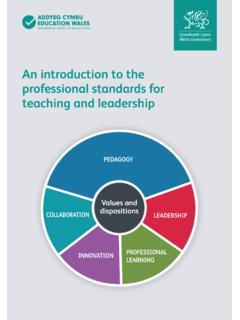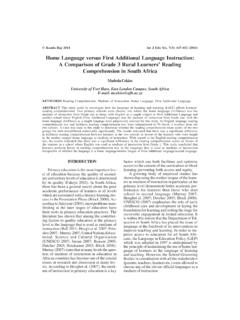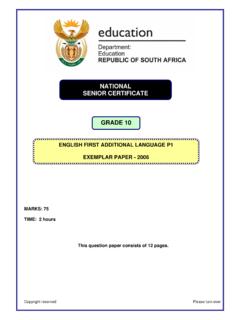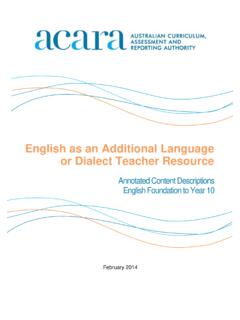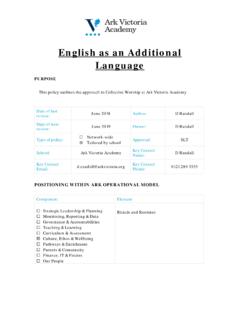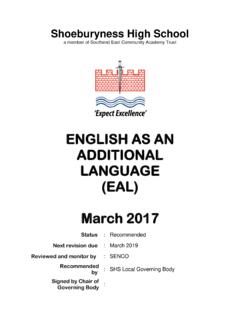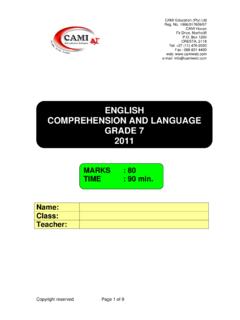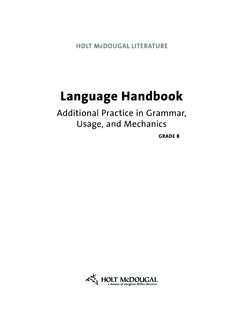Transcription of Evaluation report on capacity building approaches to ...
1 Evaluation report on capacity building approaches to support the delivery of english as an additional language in WalesDate of issue: September 2015 Audience Practitioners and leaders throughout the education system in Wales including primary and secondary, maintained and non-maintained schools; local authorities; regional consortia and government and national partners who are involved in the provision of education to learners whose first language is not The purpose of this document is to share capacity building approaches and good practice in providing support to learners whose first language is not english . This is an independent review by the People and Work Unit, commissioned by the Welsh Government. Views expressed in this report are those of the researcher and not necessarily those of the Welsh None for information Further Enquiries about this document should be directed to:information Diverse Learners and Safeguarding Team support for Learners Division Infrastructure, Curriculum, Qualifications and Learner support Directorate Welsh Government Cathays Park Cardiff CF10 3NQ Tel: 029 2082 3901 e-mail: This document can be accessed from the Welsh Government s copies website at Minority ethnic achievement in education in Wales (2014) documents Welsh as an additional Language: Research into the level of need and current support provided to black and minority ethnic pupils with Welsh language support needs (2014) Social Research Number.
2 46/2014 Evaluation report on capacity building approaches to support the delivery of english as an additional language in Wales Crown copyright 2015 WG26441 Digital ISBN 978 1 4734 4616 8 Contents Glossary of acronyms 2 report summary 3 Study aim 3 The need 3 Conclusions 4 1. Introduction 6 Methodology 6 2. english as an additional Language in Wales: Context and needs 7 support need 8 Acquisition of english 8 Measuring acquisition of english 9 Attainment and EAL 10 support for EAL in Wales 11 3. approaches to capacity building to meet EAL needs 15 Teachers 17 Differentiation 20 Professional development 20 In-class support and additional resources 21 Family support 22 EAL and school improvement 23 Targeting work 25 Data and the virtual headteacher 27 4.
3 Analysis 29 The staged approach to language acquisition 30 The policy context 30 Whole-school approaches 31 Teaching capacity 32 Using data 32 Collaboration and learning 32 5. Conclusions 34 What is good for EAL pupils is good for all pupils 34 Protect and develop the achievement focus of EAL 34 Data interrogation and person-centred planning 35 Family and community and other extra-school links 35 Build on what works 35 2 Glossary of acronyms BTA: Bi-lingual Teaching Assistant EAL: english as an additional Language EMAS: Ethnic Minority Achievement Service ESF: European Social Fund GCSE: General Certificate of Secondary Education LA: Local Authority MEAG: Minority Ethnic Achievement Grant MELAP: Minority Ethnic Language and Achievement Project NALDIC: National Association for Language Development in the Curriculum NEET: Not in Employment, Education or Training OECD: Organisation of Economic Cooperation and Development PLASC: Pupil Level Annual School Census TA.
4 Teaching assistant 3 report summary Study aim The aim of this study was To identify capacity building approaches to equip mainstream teachers in supporting minority ethnic achievement . The objective of the study is the identification and dissemination of successful strategies and approaches to upskilling classroom teachers in the delivery of english as an additional Language (EAL) . The Minority Ethnic Achievement Grant (MEAG) is an annual grant provided by the Welsh Government to local authority education services, and it is used primarily to support EAL through Ethnic Minority Achievement Services (EMAS). EMAS operate in every Welsh county, although some are shared with neighbouring local authorities. These services vary in the support that they offer and its focus. All EMASs are working to develop the capacity of schools to meet the needs of pupils with EAL through the provision of training, mentoring and additional resources to school staff.
5 All also provide bilingual teaching assistants, although there is a variation in the way these are deployed. During the course of this research project, arrangements were being made to discontinue the MEAG as a dedicated grant scheme. In April 2015, the Welsh Government will introduce different grant arrangements which will see the implementation of the Education Improvement Grant. This grant scheme brings together 11 different education grant regimes previously operated by the Welsh Government, including the MEAG. The study consulted with eight EMAS and with five schools and invited comments from other EMAS. This report pulls together the findings from consultations with EMASs and with schools, a review of education policy documents, reports submitted by EMAS in relation to their MEAG funding and short literature review. The need Around 7 percent of pupils in Welsh schools have a need for english as an additional language (EAL) support .
6 Of these, 60 percent are in three counties, Cardiff, Newport and Swansea, but all counties in Wales have EAL learners. The number of pupils needing EAL support in Wales has remained fairly constant, but the proportion that have no, or very little, english grew from 24 percent in 2008/9 to 28 percent in 2012/13 (PLASC). In the same period the proportion of EAL pupils that are fluent in english dropped from 44 percent to 27 percent (ibid). Wales uses a five stage approach to measuring language acquisition from A, which equates to new to english , to E which equates to fluent . There is a strong concentration of resources on pupils at stage A. EMASs and schools raised a concern that those who were socially fluent may not have their needs recognised, and that social fluency would be insufficient to achieve academically. In addition, the needs of second or third generation British children who only speak english in school can also be missed as they are not seen as being new to english .
7 4 Research shows that the length of time required to achieve academic competence in a language can be anything between 5 and 10 years (Collier 19891).The needs of EAL pupils can be complex. Issues effecting language acquisition include the age of the child or young person at stage A; competence in the home language; issues inherent in learning another language; social and economic factors, including levels of parental education, previous education experiences and the home learning environment; and cultural and migration histories. These factors suggest that standardised model of EAL support would be less effective than a person-centred approach to planning and delivering EAL support . Conclusions The numbers of different languages spoken by pupils, the range of previous education experience and the variety of entry points into the Welsh education system combine to make the delivery of EAL support by a central service non-viable, therefore the focus of EMAS work has increasingly become focused on capacity building for schools to meet their pupils EAL needs.
8 There is plenty of guidance and research on how this is done. How to develop this approach to EAL across Wales, however, is more complex. EMAS support for a school based approach tends to focus on a department (in a secondary school), or one or more teachers, identified within the school. The specialist teacher will work alongside these, helping them develop tools and techniques, resources and confidence with a focus is on helping the school rather than individual pupils. However, both the literature and discussions with EMASs provide mixed evidence on whether this leads to a whole school approach. Schools were described as rarely prioritising EAL support , even when they have a large number of pupils with EAL needs. They may rely on outside help from EMAS, or may treat an EAL student as having a special educational need, so sidelining the problem. This creates particular challenges to developing whole school approach. The study identified that the key requirements for building a whole school approach to supporting EAL are: mapping EAL support into key school improvement and equalities policies and practices including the Literacy and Numeracy Framework, professional development strategies and school improvement plans improving the role of school challenge and support and inspection processes to more effectively monitor and promote good practice in EAL a focus on achievement and flexibility and creativity in using the curriculum and accreditation models using school data more effectively to monitor and evaluate the development of language skills.
9 The virtual headteacher role adopted by some EMAS, a combination of the school challenge adviser s data interrogation role, the active parent s quality management role, and the specialist teacher s mentoring and development role, offered a valuable model to complement school use of data 1 Collier, V. 1989. How Long? A synthesis of research on academic achievement in a second language. TESOL Quarterly. Vol 33. No. 3. Pp: 509-531 5 commitment from the senior management team that recognises how the approach needed to support EAL learners is relevant to support for all learners, including effective differentiation based on analysis of individual learner s needs provide training and mentoring to develop the confidence of teachers in using differentiation effectively with EAL learners strategies for family engagement and for including cultural diversity in the school curriculum promoting and improving competence in home languages.
10 In addition there may be a need to provide specific support to schools with large numbers of pupils at stage A. 6 1. Introduction As set out in the specification, the aim of this study was To identify capacity building approaches to equip mainstream teachers in supporting minority ethnic achievement . The objective of the study is the identification and dissemination of successful strategies and approaches to upskilling classroom teachers in the delivery of english as an additional Language (EAL) . Methodology The project ran between August and November 2014. It started with a review of the 2013/14 local authority Ethnic Minority Achievement Services (EMAS) plans and end of year outcome reports relating to the Minority Ethnic Achievement Grant (MEAG) allocations from the Welsh Government. The project then undertook a desk based review of key documents, articles and journals. An email was sent from the Diverse Learners Branch of the Welsh Government to all local authority Ethnic Minority Advisory Services (EMAS) asking for cooperation with the project and for feedback on capacity building approaches .


